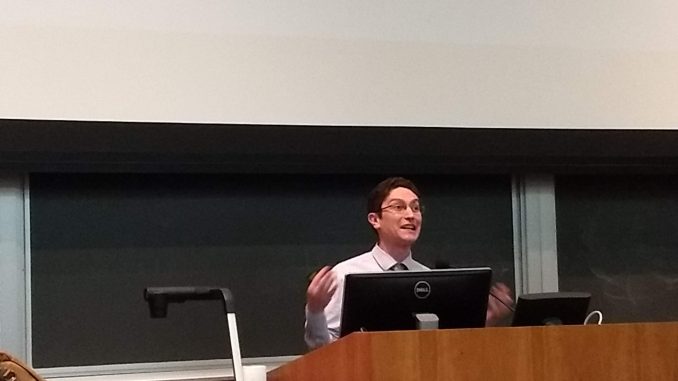
With a new semester underway, New Paltz’s department of psychology and Campus Auxiliary Services have invited Dr. Justin C. Hulbert, the principal investigator of the Memory Dynamics Lab of Bard College to their Cognitive Science Colloquium series. These talks are hosted every semester and features speakers involved in the field of cognitive science, which is defined as “the study of thought, learning and mental organization, which draws on aspects of psychology, linguistics, philosophy, and computer modeling.”
This talk was held on Feb. 25 from 5 p.m. to 6 p.m. at the Coykendall Science Building Auditorium. These talks have been organized by Professor of Psychology Giordana Grossi for the past six years. Grossi could not be reached for comment at the time of print.
Hulbert founded the Memory Dynamics Lab of Bard College in 2015. According to Bard College, “[Hulbert] received his Bachelor’s in psychology from the University of Pennsylvania and his Ph.D. from the University of Cambridge, where he studied memory control under the supervision of Michael C. Anderson.” Before joining Bard College, Hulbert held a postdoctoral fellowship at Princeton in Professor of Psychology Kenneth Norman’s Computational Memory Lab.
Hulbert’s lecure was based on his research in the field of memory dynamics—which is what the brain does when it tries to remember, forget or use memory in a wide variety of means. Hulbert divided his talks into two distinct sections: “We’ll start by examining how attempts to forget the past impair new learning, resulting in generalized periods of amnesia,” Hulbert said. “Next I’ll move on to describe evidence suggesting how certain early life traumas could actually provide opportunities to gain greater facility over exerting memory control.”
Hulbert demonstrated the first part of his research by playing a brief memory game with the audience. They had to remember a word, and another word associated with it on three occasions. He then presented two of these words again, asking audience members to either remember or try to forget the associated word. The third word was used as a baseline, or a control.
This method is dubbed the “think/no-think paradigm” and was a huge part in Hulbert’s research on memory and forgetting. Much like the audience, Hulbert found that his research subjects either forcefully blocked the associated word or tried to draw new associations with the original word. Hulbert also found that people were generally successful in forgetting, although there were lasting consequences when people tried to forcefully forget memories, resulting in areas of amnesia that occured around the desired target, dubbed the amnesiac shadow.
The next part of Hulbert’s talk was applying other paradigms on traumatic incidents. In other studies, Hulbert found that direct suppression was largely ineffective in people with PTSD, as opposed to those who do not have it. Hulbert noted that people who have not gone through traumatic incidents have the opportunity to train their minds to forget so that they are better equipped to deal with trauma in the future.
When Hulbert concluded, he opened the floor to questions regarding his talk and his findings. A brief reception was held after the talk where audience members could talk to Hulbert or members of the psychology department one-on-one.
Assistant professor of psychology Elizabeth Hirshon asked Hulbert to speak at SUNY New Paltz. Hirshon and Hulbert knew each other from their time at the University of Pennsylvania.
“We sort of caught up on what he’s been up to and realized that it would be a really good fight for our series,” said Hirshon. “He does really interesting work and uses really clever behavioral paradigms to address pretty complex cognitive processes.”
Response to the Hulbert’s lecture has been positive. “He had amazing presentation skills,” said third—year English major Alex Gerber. “It was really fascinating. [Hulbert presented his] findings in really interesting ways. It shows that the brain is less modulated than I thought.”
Hulbert hopes students and audience members have a new understanding of forgetting. “Forgetting is not always a bad thing,” Hulbert explained. “While certainly it can be frustrating or embarrassing when you forget somebody’s name, there are many occasions, oftentimes we don’t realize it, at the moment when it’s important for people to flexibly prevent other memories that are not contextually relevant or perhaps distracting from coming to mind.”
Hulbert also acknowledges that the consequences of controlling one’s memory need to be examined through the two methods discussed in his talk. “It may be that by pushing something out of mind now means you’re better off, but what does that mean when you next need to retrieve that memory when circumstances have changed?” Hulbert said. “That’s a large part of what my laboratory is exploring: those unintended consequences of trying to maintain something of a spotless mind.”
